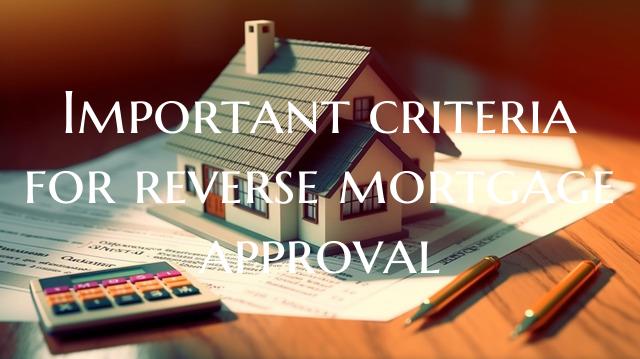Important criteria for reverse mortgage approval

Reverse mortgages are a financial tool that allows homeowners aged 62 and older to convert a portion of their home equity into cash. However, not everyone who applies for a reverse mortgage is automatically approved. Lenders evaluate several key criteria before approving a reverse mortgage application. Here are some important criteria for reverse mortgage approval:
1. Age and Homeownership: To be eligible for a reverse mortgage, the homeowner must be at least 62 years old and must own their home outright or have a considerable amount of equity in their property.
2. Home Value: Lenders consider the appraised value of the home when determining the maximum loan amount available through a reverse mortgage. The higher the home value, the more equity is available to the homeowner.
3. Financial Assessment: Lenders assess the borrower's financial situation to ensure they have the means to cover property taxes, insurance, and other ongoing home expenses. They may look at income, assets, and credit history to determine financial stability.
4. Loan-to-Value Ratio: Lenders calculate the loan-to-value ratio, which is the amount of the loan compared to the value of the home. Low loan-to-value ratios may improve the chances of approval.
5. Occupancy Requirement: The borrower must certify that the home is their primary residence. Failure to meet this requirement could lead to default on the loan.
6. Property Condition: Lenders may require the home to meet certain minimum property standards to qualify for a reverse mortgage. Repairs or improvements may be necessary to meet these standards.
7. Reverse Mortgage Counseling: Before getting a reverse mortgage, homeowners are required to undergo counseling with a HUD-approved counselor. This education helps ensure that borrowers fully understand the terms and implications of a reverse mortgage.
8. Debts and Obligations: Lenders will consider the borrower's existing debts and financial obligations when determining eligibility for a reverse mortgage. High levels of debt or financial hardship could impact approval.
9. Loan Limits: There are limits on how much you can borrow with a reverse mortgage, based on the FHA loan limit for your area. Exceeding these limits may affect approval.
Understanding these important criteria for reverse mortgage approval can help homeowners assess their eligibility and prepare for the application process. It's essential to work with a reputable lender and seek guidance from financial advisors to make informed decisions about reverse mortgages.
